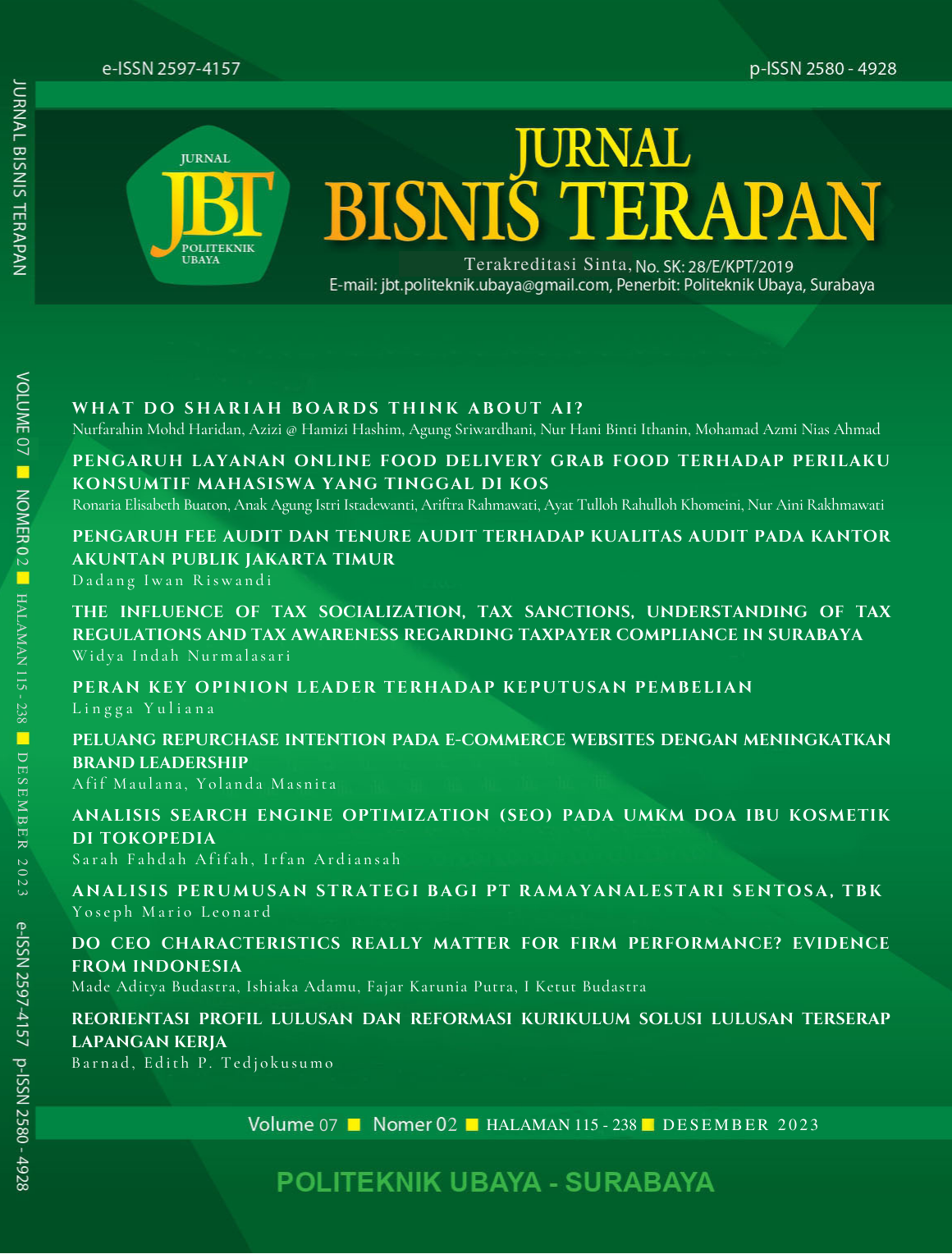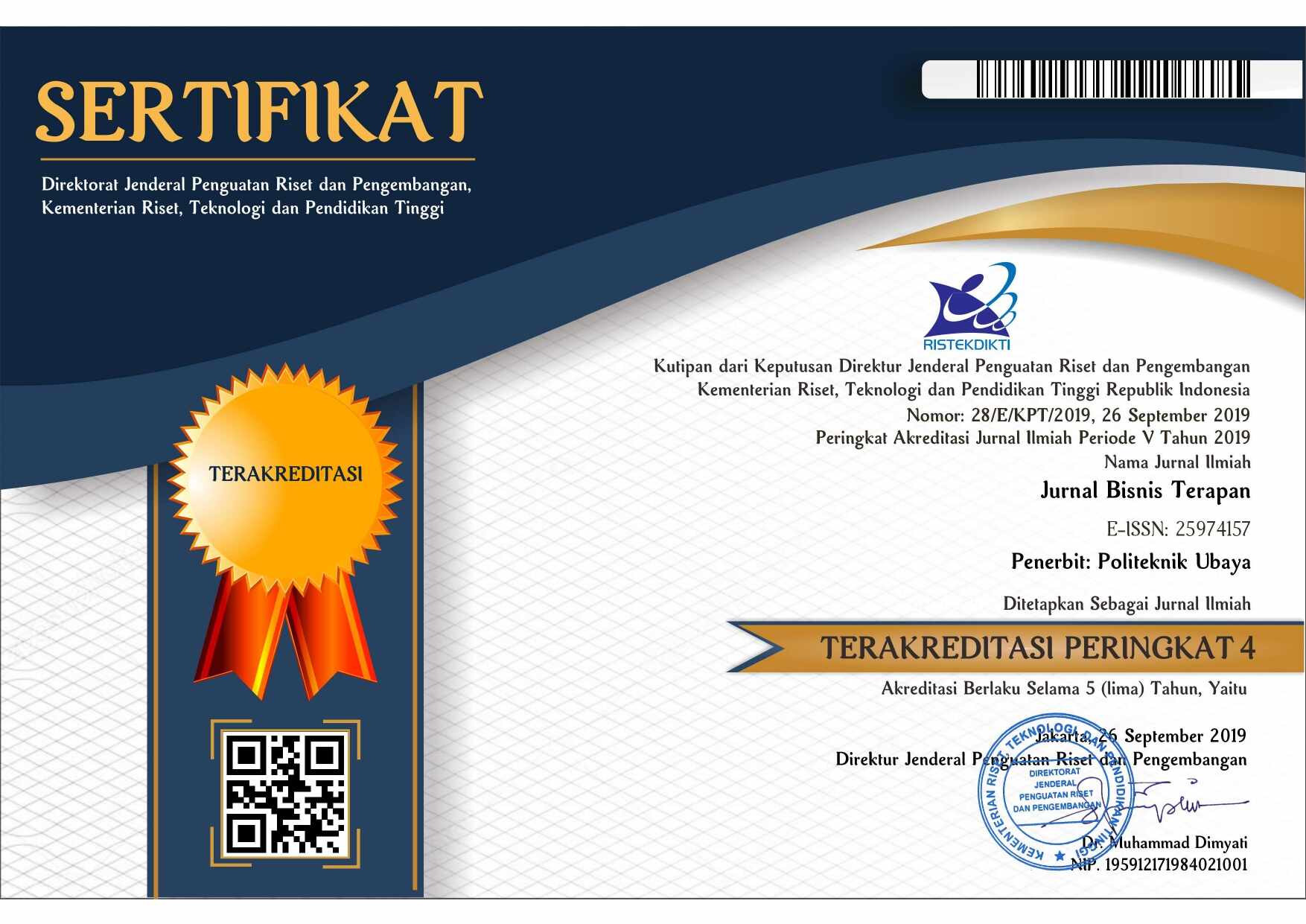WHAT DO SHARIAH BOARDS THINK ABOUT AI?
 Abstract Views:
983 times
Abstract Views:
983 times
 PDF Downloads:
759 times
PDF Downloads:
759 times
Abstract
This paper provides a critical discussion on the functions and capabilities of Shariah boards, considering their ultimate authority in delivering Shariah assurance to stakeholders of Islamic banks. The primary objective of this initiative is to enhance the proficiency of Islamic banking in the realm of digital finance advancement while ensuring rigorous adherence to Shariah principles. This paper discusses the significance of robo advisory in facilitating real-time Shariah counsel by Shariah boards. Additionally, it highlights the potential of blockchain management systems (BMS) in augmenting the monitoring function of Shariah boards, namely in conducting reviews and audit assessments to ensure Shariah compliance in Islamic banks.
Downloads
References
AAOIFI. (1998). Accounting and Auditing Standards for Islamic Banks and Financial Institution. Manama, Bahrain: Accounting and Auditing Standards for Islamic Financial Institutions.
AAOIFI. (2010). Financial Accounting Standards. Manama, Bahrain: Accounting and Auditing Organization for Islamic Financial Institutions.
Abdeldayem, M. and Aldulaimi, S. (2022). Developing an Islamic crowdfunding model: A new innovative mechanism to finance SMEs in the Middle East. International Journal of Organizational Analysis, Vol. ahead-of-print No. ahead-of-print.
Abedifar, P. (2019). Lending, the poor, and Islamic scripture: Islamic finance versus welfare Islam. Journal of the American Academy of Religion, 87(2), pp. 460-482
Abedifar, P., Ebrahim, S.M., Molyneux, P. and Tarazi, A. (2015). Islamic banking and finance: Recent empirical literature and directions for future research. Journal of Economic Surveys, 29(4), pp. 637- 670.
Abu-Tapanjeh, A. M. (2009). Corporate governance from the Islamic perspective: A comparative analysis with OECD Principles. Critical Perspectives on Accounting, 20, pp. 556-567.
Ahamed, M. M., Mallick, S. K. (2019). Is financial inclusion good for bank stability? International evidence. Journal of Economic Behavior & Organization, 157, pp. 403-427
Alshater, M. M., Saba, I., Supriani, I. and Rabbani, M. R. (2022). Fintech in islamic finance literature: A review. Heliyon, 8(9), p. 10385.
Bakar, N.A., Rosbi, S. and Uzaki, K. (2017). Cryptocurrency framework diagnostics from Islamic finance perspective: A new insight of bitcoin system transaction. International Journal of Management Science and Business Administration, 4(1), pp. 19-28.
Banna, H., Hassan, M. K. and Rashid, M. (2021). Fintech-based financial inclusion and bank risk taking: Evidence from OIC countries. Journal of International Financial Markets, Institutions & Money, 75, p. 101447
Bougatef, K. (2015). The impact of corruption on the soundness of Islamic banks. Borsa Istanbul Review.
Bukht, T.F.N., Raza, M.A., Awan, J.H. and Ahmad, R. (2020). Analyzing cyber-attacks targeted on the Banks of Pakistan and their Solutions. International Journal of Computer Science and Network Security, 20(2).
Chapra, M. U. and Ahmed, H. (2002). Corporate governance in Islamic financial institutions. Islamic Development Bank: Islamic Research and Training Institute.
Chong, F. H. L. (2021). Enhancing trust through digital Islamic finance and blockchain technology. Qualitative Research in Financial Markets, 13(3), pp. 328-341
Daud, S. N. M., Ahmad, A. H., Khalid, A. and Azman-Saini, W. N. W. (2022). FinTech and financial stability: Threat or opportunity?. Finance Research Letters, 47, p. 102667
De Bakker, F. G. A., Rasche, A. and Ponte, S. (2019). Multi-Stakeholder Initiatives on Sustainability: A Cross-Disciplinary Review and Research Agenda for Business Ethics. Business Ethics Quarterly, 29(3), pp. 343-383.
Depietro, A. (2018). Blockchain and Islamic banking are working together, and everyone stands to benefit. The Forbes. Retrieved from https://www.forbes.com/sites/andrewdepietro/2018/07/11/blockchain-islamic-banking benefits/?sh=3586da383af2
Dowling, J. and Pfeffer, J. (1975). Organizational legitimacy: Social values and organizational behavior. Pacific Sociological Review, 18, pp. 122-36.
Dusuki, A. W. (2008). Understanding the objectives of Islamic banking: A survey of stakeholders’ perspectives. International Journal of Islamic and Middle Eastern Finance and Management, 1 (2), pp. 132-148.
Farag, H., Mallin, C. and Ow-Yong, K. (2018). Corporate governance in Islamic banks: New insights for dual board structure and agency relationships. Journal of International Financial Markets Institutions and Money, 54, pp. 59-77.
Feghali, K., Mora, N., Nassif, P. (2021). Financial inclusion, bank market structure, and financial stability: International evidence. The Quarterly Review of Economics and Finance, 80, pp. 236-257
Garas, S. N. and Pierce, C. (2010). Shari’a supervision of Islamic financial institutions. Journal of Financial Regulation and Compliance, 18(4), pp. 386-407
Ginena, K. (2014). Shariah risk and corporate governance of Islamic banks. Corporate Governance: The International Journal of Business in Society, 14(1), pp. 86-103.
Ginena, K. and Hamid, A. (2015). Foundations of Shari’ah Governance of Islamic Banks. The Wiley Finance Series.
Haridan, N. F. M., Hassan, A. F. S. and Karbhari, Y. (2018). Governance, religious assurance and Islamic banks: Do Shariah boards effectively serve? Journal of Management and Governance, 22(4), pp. 1015- 1043
Haridan, N. M., Hassan, A.F. S., Shah, S. M. and Mustafa, H. (2023). Financial innovation in Islamic banks: Evidence on the interaction between Shariah board and FinTech. Journal of Islamic Accounting and Business Research, 14(6), pp. 911-930.
Hassan, M. K., Aliyu, S., Huda, M. and Rashid, M. (2019). A survey on Islamic finance and accounting standards. Borsa Istanbul Review, 19, pp. S1-S13
Hassan, M. K., Khan, A. and Paltrinieri, A. (2019). Liquidity risk, credit risk and stability in Islamic and conventional banks. Research in International Business and Finance, 48, pp. 17-31.
IFSB-9. (2009). Guiding Principles on Conduct of Business for Institutions Offering Islamic Financial Services. Islamic Financial Services Board.
Koulu, R. (2016). Blockchains and online dispute resolution: Smart contracts as an alternative to enforcement. Journal of Law, Technology & Society, 13(1), pp. 40-69.
Kwilinski, A. (2019). Implementation of blockchain technology in accounting sphere. Academy of Accounting and Financial Studies Journal, 23, pp. 1-6.
La Torre, M., Botes, V.L., Dumay, J. and Odendaal, E. (2021). Protecting a new Achilles heel: The role of auditors within the practice of data protection. Managerial Auditing Journal, 36(2), pp. 218-239.
La Torre, M., Dumay, J. and Rea, M.A. (2018). Breaching intellectual capital: Critical reflections on big data security. Meditari Accountancy Research, 26(3), pp. 463-482.
Laldin, M. A. and Djafri, F. (2019). Islamic Finance in The Digital World: Opportunities and Challenges (Kewangan Islam dalam Dunia Digital: Peluang dan Cabaran). Journal of Islam in Asia (E-ISSN 2289- 8077), 16(3), pp. 283-299.
Lee, I. and Shin, Y. J. (2018). Fintech: Ecosystem, business models, investment decisions, and challenges. Business Horizons, 61 (1), pp. 35-46.
Lin, C.-C.; Huang, A.Y.Q.; Yang, S.J.H. (2023) A Review of AI-Driven Conversational Chatbots Implementation Methodologies and Challenges (1999–2022). Sustainability, 15, 4012. https://doi.org/ 10.3390/su15054012
Manita, R., Elommal, N., Baudier, P. and Hikkerova, L. (2020). The digital transformation of external audit and its impact on corporate governance. Technological Forecasting and Social Change, 150.
Mannai, M. A. and Ahmed, H. (2019). Exploring the workings of Shari’ah supervisory board in Islamic finance: A perspective of Shari’ah scholars from GCC. The Quarterly Review of Economics and Finance, 74, pp. 97-108.
Meera, A.K.M. (2018). Cryptocurrencies from Islamic perspectives: The case of bitcoin. Bulletin of Monetary Economics and Banking, 20(4), pp. 475-492
Mollah, S. and Zaman, M. (2015). Shari’ah supervision, corporate governance and performance: Conventional vs. Islamic banks. Journal of Banking & Finance, 58, pp. 418-435.
Muedini, F. (2018). The compatibility of cryptocurrencies and Islamic finance. European Journal of Islamic Finance, 10, pp. 1-10.
Mukhibad, H., Nurkhin, A., Anisykurlillah, I., Fachrurrozie, F. and Jayanto, P. Y. (2023). Open innovation in shariah compliance in Islamic banks – Does shariah supervisory board attributes matter?. Journal of Open Innovation: Technology, Market, and Complexity, 9, p. 100014
Najeeb, S. F. and Ibrahim, S. H. M. (2014). Professionalizing the role of Shariah auditors: How Malaysia can generate economic benefits. Pacific-Basin Finance Journal, 28, pp. 91-109.
Noordin, K.A. (2018, September 6). Islamic finance: Is cryptocurrency halal? The Edge Market. Retrieved from https://www.theedgemarkets.com/article/islamic-finance-cryptocurrency-halal.
Oseni, U.A. and Ali, S.N. (2019). Fintech in Islamic Finance: Theory and Practice. (1st ed). London: Taylor and Francis Group.
Oseni, U.A. and Omoola, S.O. (2015). Banking on ICT: The relevance of online dispute resolution in the Islamic banking industry in Malaysia. Information & Communications Technology Law, 24(2), pp. 205-223.
Othman, R. and Ameer, R. (2015). Conceptualizing the duties and roles of auditors in Islamic financial institutions: What makes them different? Humanomics, 31(2), pp. 201-213
Poon, J., Chow, Y. W., Ewers, M. and Ramli, R. (2020). The role of skills in Islamic financial innovation: Evidence from Bahrain and Malaysia. Journal of Open Innovation: Technology, Market, and Complexity, 6, p. 47
Quttainah, M.A. and Almutairi, A.R. (2016). Corporate ethics: evidence from Islamic banks. Journal of Management and Governance.
Safieddine, A. (2009). Islamic financial institutions and corporate governance: New insights for agency theory. Corporate Governance: An International Review, 17(2), pp. 142-158.
Safiullah, M., Hassan, M. K. and Kabir, M. N. (2022). Corporate governance and liquidity creation nexus in Islamic banks—Is managerial ability a channel?. Global Finance Journal, 51.
Sidaoui, M., Ben Bouheni, F., Arslankhuyag, Z. and Mian, S. (2022). Fintech and Islamic banking growth: New evidence. Journal of Risk Finance, 23(5), pp. 535-557.
Suchman, M. C. (1995). Managing legitimacy: strategic and institutional approaches. Academy of Management Review, 20, pp. 571-610.
Tajudin, M., Omar, R., Smedlund, A., Aziz, R. P. (2020). Financing with heart and intelligence: Augmenting intimacy and sustainability through Islamic fintech. International Journal of Advanced Science and Technology, 29(9s), pp. 1638-1664.
Todorof, M. (2018). Shariah-compliant FinTech in the banking industry. ERA Forum, 19, pp. 1-17.
U.S. Securities and Exchange Commission. (2022). SEC charges robo-adviser with misleading clients, February 10, available at: https://www.sec.gov/news/press-release/2022-24.
Ullah, S., Harwood, I. A. and Jamali, D. (2018). ‘Fatwa repositioning’: The hidden struggle for Shari’a compliance within Islamic financial institutions. Journal of Business Ethics, pp. 1-23.
Weber, M. (1978). Economy and society. Berkeley: University of California Press.
Xuesong Zhai, Xiaoyan Chu, Ching Sing Chai, Morris Siu Yung Jong, Andreja Istenic, Michael Spector, Jia-Bao Liu, Jing Yuan, Yan Li, (2021) "A Review of Artificial Intelligence (AI) in Education from 2010 to 2020", Complexity, vol. 2021, Article ID 8812542, 18 pages, 2021. https://doi.org/10.1155/2021/8812542
Yudaruddin, R. (2023). Financial technology and performance in Islamic and conventional banks. Journal of Islamic Accounting and Business Research, 14(1), pp. 100-116.


This work is licensed under a Creative Commons Attribution-NonCommercial-ShareAlike 4.0 International License.

Ciptaan disebarluaskan di bawah Lisensi Creative Commons Atribusi-NonKomersial-BerbagiSerupa 4.0 Internasional.
-
Articles published in Jurnal Bisnis Terapan are licensed under a Creative Commons Attribution-NonCommercial-ShareAlike 4.0 International (CC BY-NC-SA 4.0) license, which permits anyone to copy, transform, or redistribute articles for any lawful purpose in any medium, provided appropriate credit is given to the original author(s) and Jurnal Bisnis Terapan is recognized as its original publisher. A link to this license should also be provided. Any derivative work of an article published in Jurnal Bisnis Terapan must also be shared under the same (or compatible) license.
-
Both copyright and publishing rights on articles are retained by the respective author(s), without restrictions. Only a non-exclusive license is granted to Jurnal Bisnis Terapan to publish the article and identify itself as its original publisher.

 DOI:
DOI:






